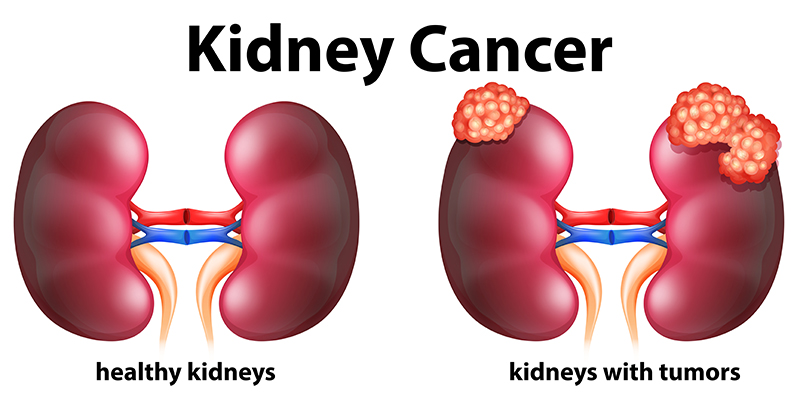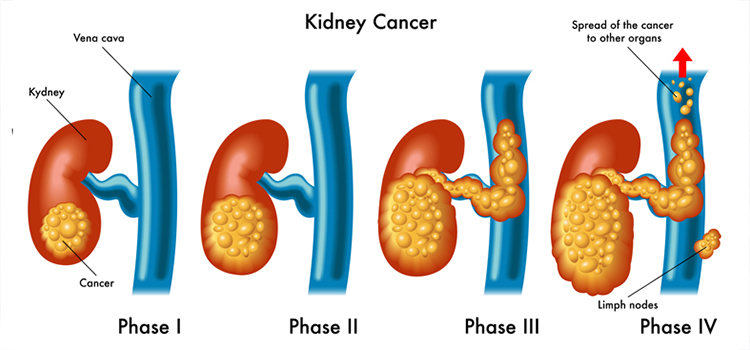Kidney Cancer :
The kidneys are two bean-shaped organs, each about the size of a fist. They are located in the lower abdomen on each side of spine. The important job of Kidney is purification of blood, removing extra fluid from the body, removing waste products, drugs, and toxins through the urine. Kidneys also removes acid which is generated by the body cells and helps to maintain balance of water, minerals and salts in the blood.

What Is Kidney Cancer?
Kidney cancer (Renal cancer) is a disorder in which kidney cells become cancerous and grow beyond control, developing in a tumour. Nearly all kidney cancers initially emerge in the lining of tiny tubes (tubules) in the kidney. Most of kidney cancers are detected before they spread to nearby organs. Early detected Cancers can be successfully treated. However, these tumours if not detected initially can grow to larger extent.
Risk factors for kidney cancer :
Symptoms of Kidney Cancer :
In many cases, no early symptoms of kidney cancer are seen. But as the tumour grows, the symptoms may appear.
A person may have kidney cancer symptoms like:
Kidney cancer that spreads to other parts of the body may cause other symptoms like:
Stages of Kidney Cancer :
Your prognosis depends on your general health, as well as the grade and stage of your kidney cancer. These are the stages of kidney cancer. The higher the stage, the more advanced the cancer.

STAGE I :
STAGE II :
STAGE III :
STAGE IV :
Treatments for Kidney Cancer :
The treatment is prescribed by the doctor based on the diagnosis report and the stage of kidney cancer.
There are various common treatments for Kidney cancer and surgery is the first step in maximum cases. Though surgery removes the complete tumour, the doctor may prescribe an additional treatment to kill the remaining cancer cells that can't be seen with naked eye.
A) Surgery for kidney cancer:
The type of surgery depends on stage of the cancer. There are three types of surgeries to remove Kidney cancer.
A person can survive with just one kidney till the time it is working. If the surgeon removes both kidneys, then a machine is used to clean the blood (dialysis) or implant a new kidney (kidney transplant).
Kidney transplant is feasible if the cancer is detected only in a person’s kidney and also if a donated kidney is available.
B) Biologic therapy for kidney cancer :
This therapy uses a person’s immune system to battle with the cancer by directing, boosting, or reinstate your body's natural defences. Examples of biologic therapy for metastatic kidney cancer include interferon alpha or interleukin 2.
C) Targeted therapy for kidney cancer :
This therapy uses drugs or other substances to detect and spot the cancer cells with less degree to normal cells. One type of targeted therapy is anti-angiogenic agents which keep blood vessels from feeding a tumour, allowing it to shrink or protect it from growing.
Multikinase inhibitors or tyrosine kinase inhibitors are the second type of targeted agent which are oral drugs that obstructs an enzyme route which aids in the growth of cancer cells.
M-TOR inhibitors is the third type of targeted therapy for Kidney Cancer.
D) Radiation therapy for kidney cancer:
Radiation therapy is regularly used to detect the symptoms of kidney cancer or is used in case of those patients who cannot have surgery. High-energy X-rays or other types of radiation are used in this treatment to kill cancer cells or obstruct their growth. In External radiation therapy it sends radiation to the cancer through a machine outside the body.
E) Chemotherapy for kidney cancer:
In Chemotherapy (chemo) Oral tablets /pills are given or anti-cancer drugs are inserted into the vein (IV). The drugs enter the blood and spread almost all over the body, which makes this treatment certainly useful for cancer that has spread (metastasized) to organs beyond the kidney.
Chemo is not a quality treatment for kidney cancer because kidney cancer cells normally do not respond well to chemotherapy. Chemo is generally used for kidney cancer only after the trail of the use of Immunotherapy or targeted drugs.
Doctors give chemotherapy in cycles, with duration of treatment followed by interval to permit the time to the body to recover. Chemo cycles generally last a few weeks.


